Separation Anxiety – a common problem
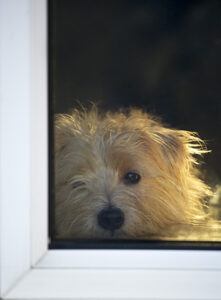 Separation Anxiety – a common problem, is one of those behaviours that owners need to solve. It not only stresses out the dog, owners are also stressed and concerned about their dog’s obvious anxiety when they are left alone. We hate to think our precious pet is suffering for whatever reason, so here are a few tips to help stop this anxious behaviour
Separation Anxiety – a common problem, is one of those behaviours that owners need to solve. It not only stresses out the dog, owners are also stressed and concerned about their dog’s obvious anxiety when they are left alone. We hate to think our precious pet is suffering for whatever reason, so here are a few tips to help stop this anxious behaviour
When you go out
Before most owners go out, they will talk to their dogs, telling them they won’t be long, give them a treat and a toy and cuddle them, waving goodbuy at the door, blowing a kiss etc. etc.. Your dog knows you’re going out so you don’t need to do anything. All you’re doing is winding him up so when you do leave, he is already in a stressed state.
What to do instead
Calmly get ready to go out and ignore your dog completely. Make sure he has all he needs while you’re away, including water, some toys and perhaps a Kong with some treats in it to keep him amused after you leave. Say nothing, don’t look at him, don’t touch him, just walk out the door. If you are calm, he will become calm. You do not want to leave him in an excited state.
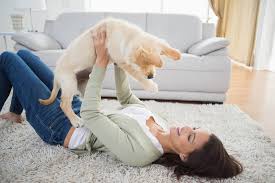 When you come home
When you come home
When you come home, what do you do. You greet your dog, you cuddle him and kiss him, give him a treat, throw his ball, find his favourite toy, give him some dinner, he is very excited. But do you really want him to be so excited. All the time you are away, he is looking forward to your home coming. He is already excited before you get to the door. What you want is a calm dog greeting you quietly and settling down as soon as you come in.
What to do instead
Don’t greet him, ignore him! Yes I said ignore him. Walk passed him, take your coat off, go to the loo, get yourself a cuppa but ignore him, until he has calmed down. Don’t even look at him. When he is calm you can then reward that behaviour and do your thing of a cuddle, a treat, a play, feeding etc..
But I may hurt his feelings, I hear you say!
Dogs are not like us. They know more about energy than hurt feelings. The energy you’re portraying or the energy the dog next door is showing is what they pick up on. If you show weak energy, many dogs will take advantage and use your weakness to get what they want or do what they want! If you are a calm and assertive owner, your dog will be less anxious and recognise you as the one in charge and look to you for leadership. This will also help with his separation anxiety. The leader of the family or pack always returns to the den. You need to be that leader, for his sake.
Clever dog!
 Dogs are so very clever. They watch your every move and use what they learn to their advantage. When your dog puts his paw on you, you think it’s cute. Your reaction teaches him that putting his paw on you gets good results and gets your attention. That’s just one example. Think of all the other cute things he does to get your attention! If what he does is OK with you, well that’s fine but some cute behaviours can become unwanted behaviours…this is another post!
Dogs are so very clever. They watch your every move and use what they learn to their advantage. When your dog puts his paw on you, you think it’s cute. Your reaction teaches him that putting his paw on you gets good results and gets your attention. That’s just one example. Think of all the other cute things he does to get your attention! If what he does is OK with you, well that’s fine but some cute behaviours can become unwanted behaviours…this is another post!
Meanwhile, do the training
To help the process succeed, you do have to do a bit of training. Make sure your dog can sit, stay, leave, off, down and all the normal commands that he should learn. This will give him confidence and strengthen your bond with him.
But, you also need to train yourself!
- No talk, no touch, no eye contact when you first come home. Same thing when you leave.
- Keep calm at all times, if you find yourself getting frustrated, leave the room and get over it.
- Never shout. Dogs have got very sensitive hearing, shouting will not help your cause and will only make him more anxious.
- Always speak in a low calm but assertive voice.
- Never smack or physically hurt your dog, this is counterproductive.
- Use the ‘calm’ command. This is helpful for a fearful dog. Say the word long and slow and reward when he does become relaxed and calm. For a verbal reward use the word ‘good’ again softly, slowly and calmly.
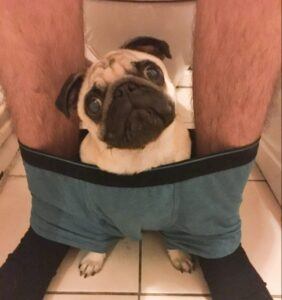 Training for Separation Anxiety
Training for Separation Anxiety
- If your dog follows you everywhere, even to the loo, slowly get him used to being on his own for a short period of time. A few seconds to start and slowly work up to a few minutes. Do this regularly until you can leave him in another room without him being anxious for at least 5 minutes.
- Now try going outside on your own for a while, in the garden if you have one. You can start by opening the front or back door and standing there for a bit, don’t let him push past you, make him stay behind you. Just a few seconds to start then work up slowly. Now try putting him in his bed and making him stay while you open the door. Wait for a little while before shutting the door. This is also good for those dogs that try and dash out of an open door. Open door should not mean dash out!
- Once your dog is calm and does not get anxious when you go out the door, you can up the anti. Go out and shut the door for a few seconds then open it and come in. Do this exercise regularly. I’m sure you get my drift by now. Progress slowly, it will take a while for him to become confident.
Build his confidence
A dog with Separation Anxiety will be lacking in confidence so how to build it? Mind games is a good place to start. Our dogs love ‘find it’ games where they have to wait in the hallway until I have hidden a number of treats around the lounge. Make them easy to find at first, then up the anti and start hiding them under a mat, or under a toy, on the top of the coffee table etc.. All dogs love this game once they realise what they have to do and use their prime sense, their nose, to accomplish it. Make sure the treats smell good and are worth finding!
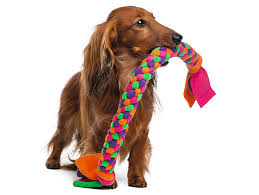 Try his favourite toy!
Try his favourite toy!
You can hide his favourite toy and then help him find it. Once he gets the idea, you can leave him to find it and reward him by playing with him and his toy or giving him a tasty treat.
There are a number of books you can buy giving ideas about brain games and showing you exactly how to teach your dog tricks and commands. Each command and trick he learns will increase his self confidence. This will also help him cope with being left alone.
Don’t give him the run of the house!
When leaving your dog alone, it can be better to leave him in a smaller area rather than letting him have the run of the house. We found that one of our dogs thought he had to protect the whole house while we were away and this made him anxious. He actually started to chew the skirting boards. It took us a while to realize he was much calmer in one room. We now leave our two dogs in the bedroom where they usually sleep at night. This is an area where they are used to being calm and asleep and I think this helps them relax.
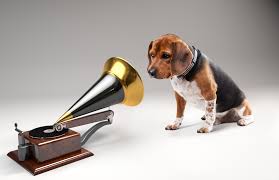 See what your dog does while you’re away
See what your dog does while you’re away
Rig up a camera and see exactly how your dog reacts while you’re away. This can be quite helpful and give you ideas on how you can help him cope with his anxiety, once you see what he reacts to. Also, if he is inclined to chew on your stuff or the furniture, less damage will be done in a single room. If you have a reactive dog that barks at outside noises, try to use a room that is in a quieter part of the home. Our dogs seem to enjoy classical music so leaving the tv or the radio on may help, not too loud though.
Your dog will react to your energy
As a little exercise, try this. Get your dog excited by picking up a toy and jumping around with it throwing it at him chasing him and having some playtime fun. Then, once he’s all excited, just stop and sit down and ignore him. Yes, he may be confused but watch what he does. You must completely ignore him though.
You calm down, he calms down
What he’s likely to do is look at you for a while, then sigh and probably shortly after, lay down, keeping an eye on you just in case you jump up again and start playing. Your dog will copy your energy. If you’re calm, he will become calm too. If you’re exited, he will get excited. If you show anger, he will be anxious and with some dogs with aggression problems, they can also copy your anger and act aggressively.
 Last but definitely not least – Exercise!
Last but definitely not least – Exercise!
How much exercise does your dog get? You must make sure he is exercised, especially before you leave him alone. This will dissipate any excess energy he may have and help him wind down before you leave. You will not calm a dog that is fired up, full of energy and rearing to go. If you haven’t exercised him, he will make his own entertainment once you leave. This will likely involve chewing or destroying your possessions.
Do not punish your dog!
By the way, if he has done damage, ignore it and just clear it up. Whatever you do, don’t punish him. He will not know why you are so annoyed and just become more anxious; it’s counterproductive. Make sure there is as little as possible that he can destroy. If he likes to chew, leave a favourite chew toy for him to try and destroy. Kong toys are usually indestructable.
And finally…
If you have any questions about separation anxiety which have not been covered in this post, please contact me. I will do my best to advise you by email. I always answer comments. Remember, be calm and assertive, never reward unwanted behaviour, always reward good behaviour. Never lose your temper or get frustrated. If you feel yourself losing it, go and get a cuppa or leave the room until you get over it! If your dog has separation anxiety, I hope this post will help you address the problem and cure your precious pet of this upsetting behaviour. Good luck!

This is very interesting. Sadly I lost two of my three dogs in the last year. They were old and just had to move on. I am not convinced that I can do what you say. My dogs are like my kids so when I leave I want to reassure them that I will be back. And I love to greet them when I come home. I think in my case, I am going to have to stick with what we do now, but I appreciate your article.
Hi Curtis, it doesn’t sound like your dogs have separation anxiety and if that’s so, there is no need to change the status quo. They are probably confident and submissive and consider you to be in charge. If that’s the case, you don’t have to worry. This post is for those that have a serious behavioural problem, usually with dogs that are needy, lacking in confidence and anxious.
Hi Ches!
I really love this article thank you for bring this into table, I have 3 dogs and I will definitely apply this techniques you thought about before and after leaving my dogs alone in our house . Keep a lot more articles like this I book marked your page.
Cheers,
Matcha
Thanks Matcha and good luck with your new training. I’m sure you will be pleasantly surprised if you stick with the instructions. I know they are hard to do, especially with those imploring eyes looking at you. But be strong. It’s for their own sake as well as yours!
I was very helpful with the tips from your site. Namely, I have a dog that I love very much, but sometimes his behavior annoys me. However, until now I didn’t know that I could actually correct my dog’s behavior. When I change my dog’s behavior we will be able to enjoy walks together.
thanks
Alexander
Stick with it Aleksandar and make sure you’re the one in charge. Have a look at this post. One of the first things to do is master the walk. Good luck!
Hello Ches,
I like the article, it trains me what to do if my dog was going through a separation anxiety. To be honest, I feel it is a little difficult for me to put into practice even if what you wrote is true.
My mother had a dog, and she used to punish him for the everything he did when she was leaving or came back. It worked for her, I have learnt thought that it is not good. But it worked for her dog.
To me, I love my dog that I can’t help but join him in his play when I return because I missed him the whole day. Thank you so much
Hi Michael, the problem with punishing a dog for everything he does wrong is he becomes frightened and anxious. He will not trust if he is nervous or wary of his owner. So it may appear that punishment works but a kinder approach will gain the respect and trust of your dog. This will make for a much closer relationship. You can still have a great time when you greet your dog, just wait until he has calmed down first. Otherwise, you are rewarding his over excitement. But if your dog does not suffer from separation anxiety, you don’t have to worry!